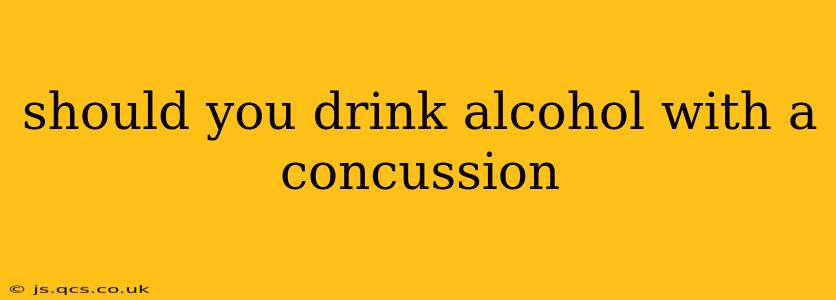Should You Drink Alcohol With a Concussion? A Definitive No
A concussion, also known as a mild traumatic brain injury (mTBI), is a serious injury that requires careful management and rest. While the urge to self-medicate might be tempting, drinking alcohol after a concussion is strongly discouraged and can significantly worsen the injury and recovery process. This is not just a recommendation; it's crucial for your brain health.
Alcohol is a depressant, meaning it slows down the central nervous system. After a concussion, your brain is already vulnerable and working hard to repair itself. Adding alcohol into the mix further hinders this process, potentially prolonging recovery time and increasing the risk of long-term complications.
What Happens When You Drink Alcohol After a Concussion?
Alcohol can exacerbate several concussion symptoms, including:
- Increased headaches and dizziness: Alcohol dehydrates the body, which can worsen headaches and dizziness – already common symptoms following a concussion. The vasoconstrictive effects of alcohol (narrowing of blood vessels) can also contribute to headaches.
- Impaired cognitive function: Alcohol interferes with cognitive function, such as memory, concentration, and decision-making. These abilities are often already affected by a concussion, and alcohol makes the impairment worse, potentially hindering recovery.
- Increased risk of seizures: In rare cases, alcohol can trigger seizures, especially in individuals already at risk. Concussions can also increase the risk of seizures, making the combination particularly dangerous.
- Delayed healing: Alcohol interferes with the brain's natural healing process. It can slow down the repair of damaged brain cells and increase the risk of long-term complications.
- Sleep disturbances: Alcohol may initially induce sleep, but it often leads to fragmented and poor-quality sleep later in the night. Consistent, restful sleep is vital for concussion recovery, and alcohol interferes with this crucial aspect.
How Long Should You Avoid Alcohol After a Concussion?
There's no one-size-fits-all answer to this question. Recovery time from a concussion varies greatly depending on the severity of the injury and individual factors. However, it's generally recommended to completely abstain from alcohol until you are fully recovered and cleared by a medical professional. This could range from several weeks to several months. Rushing back to drinking alcohol before your brain has fully healed could significantly prolong recovery and lead to long-term problems.
What Other Substances Should I Avoid After a Concussion?
In addition to alcohol, it's advisable to avoid other substances that can affect brain function, including:
- Illegal drugs: These substances can have unpredictable and potentially dangerous interactions with the brain, especially after a concussion.
- Over-the-counter medications: While some pain relievers might seem helpful, always consult your doctor before taking any medication, even over-the-counter ones, after a concussion. Some medications can interact negatively with brain healing.
What Should I Do Instead?
Focus on proper rest, a healthy diet, and following your doctor's recommendations. This may include:
- Getting plenty of sleep: Aim for 8-10 hours of quality sleep each night.
- Eating a nutritious diet: Focus on foods rich in antioxidants and nutrients that support brain health.
- Avoiding strenuous physical activity: Gradually resume activities as advised by your doctor.
- Managing stress: Find healthy ways to manage stress and anxiety, such as meditation or yoga.
- Following up with your doctor: Regular check-ups are important to monitor your progress and address any concerns.
Concussion recovery is a serious matter. Prioritizing your brain health by avoiding alcohol and other substances is crucial for a full and timely recovery. Always consult with a medical professional if you suspect a concussion. They can provide personalized advice and ensure you receive the appropriate care.
